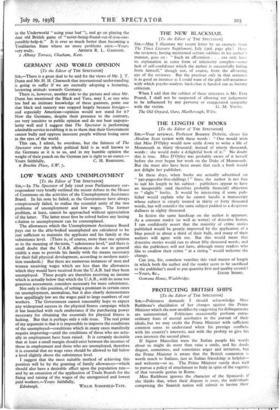THE LENGTH OF BOOKS [To the Editor of THE SPECTATOR]
Snt,—Your reviewer, Professor Bonamy Dobree, closes his Absalom Scott review with these words : " One would wish that Miss D'Oyley would now settle down to write a life of Monmouth in thirty thousand, instead of ninety thousand, words : she would make a delightful book of it." No doubt this is true. Miss D'Oyley was probably aware of it herself before she ever began her work on the Duke of Monmouth. But she must also have been aware that such a book would not delight her publisher.
In these days, when books are actually advertised on " 59o-pages4or-five-shillings ! " lines, the author is not free to suit his length to his subject : publishers appear to have an insuperable (and therefore probably financial) objection to " slight " books. It would be interesting if some pub- lisher would explain why he cannot handle a manuscript whose subject is crisply treated in thirty or forty thousand words, but will consider the same subject padded to a desperate dullness in eighty thousand.
In fiction the same handicap on the author is apparent. As a constant reader (as well as writer) of detective fiction, I can confidently assert that the majority of crime stories published would be greatly improved by the application of a blue pencil to about a third of their bulk, and many of their authors will agree with me. But this would mean that detective stories would run to about fifty thousand words, and this the publishers will not have, although many readers who like to swallow their crime " at a sitting " would welcome the change.
Can you, Sir, somehow ventilate this vital matter of length in which both the author and the reader seem to be sacrificed to the publisher's need to put quantity first and quality second?


































 Previous page
Previous page